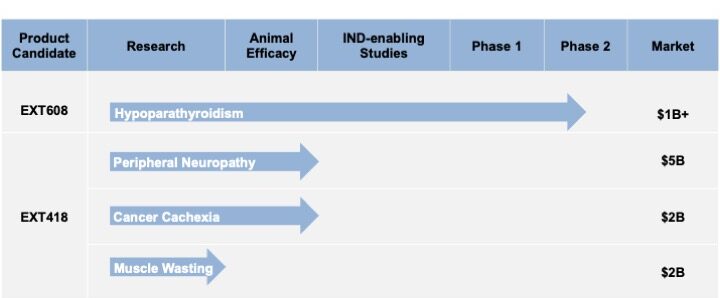
Pipeline
Extend Biosciences aims to develop safe and effective long-acting therapies that can be self-administered by the patient at home. The company has multiple compounds in development using the D-VITylation platform.
EXT608 for Hypoparathyroidism
Our lead program is a long-acting PTH(1-34) for the treatment of hypoparathyroidism. This rare disease is characterized by inappropriately low circulating levels of parathyroid hormone (PTH), and is most commonly caused by inadvertent removal of the parathyroid glands during neck surgery, and less commonly by autoimmune diseases and rare genetic disorders. PTH is a key regulator of calcium and phosphorous homeostasis in the kidneys, movement of calcium from the skeleton, and the production of the active form of vitamin D in the kidneys.
Conventional treatment for hypoparathyroidism (calcium and active vitamin D supplements) focuses on maintaining serum calcium levels while preventing the risk of hypercalciuria, or excessive urinary calcium secretion, which can ultimately lead to kidney failure.
Our long-acting PTH is a subcutaneously administered PTH derivative with an attractive value proposition. The pharmacokinetic profile our D-VITylated PTH(1-34) conjugate mimics the physiological levels of PTH, thereby returning and maintaining serum calcium and phosphate levels within the normal range. EXT608 is currently in Phase 2 clinical trials.
EXT418 for Diabetes-induced Peripheral Neuropathy
Neuropathy is an acquired disease that can lead to debilitating chronic pain affecting 7% to 10% of the general population. Sleep disturbances, anxiety and depression are common among patients with symptomatic neuropathy, negatively impacting quality of life. Diabetes is a leading cause of neuropathy and is expected to become more prevalent as the incidence of diabetes increases. Unfortunately, there are no disease modifying therapeutics that can prevent neuropathy or regenerate nerves. While there are palliative treatments for pain symptoms, they are effective in less than 50% of patients, and use of opioids is restricted for the most severe cases of chronic pain as they can lead to addiction. Clearly there is a need for safe, effective, well-tolerated drugs to treat painful neuropathy by halting or reversing the underlying pathology of the disease. One promising approach to treating painful neuropathy without opioids is the use of ghrelin, a 28-amino acid acylated peptide hormone. Ghrelin is thought to treat peripheral neuropathy through its anti-inflammatory and anti-oxidative properties and by promoting cellular repair and preventing neuronal apoptosis. However, native ghrelin has a short half-life and must be delivered via a constant intravenous infusion to have a therapeutic effect. The D-VITylation platform technology is truly enabling for this short-lived peptide as it increases the half-life and improves the bioavailability of the peptide in the body. EXT418 would be a novel long-acting peptide hormone therapeutic that is a safe and non-addictive alternative to opioids that has the potential to be disease-modifying. Efficacy studies are complete, and this compound is IND-ready.
EXT418 for Cachexia
EXT418 is also under development for cachexia, a complex metabolic syndrome characterized by involuntary weight and muscle loss that affects >1 million patients/year. Cancer and other devastating chronic diseases such as congestive heart failure and AIDS are often coupled with cachexia. Studies have shown that cancer patients who have cachexia respond poorly to chemotherapy, are at a greater risk of infection and have a reduced life expectancy. In fact, it is estimated that at least 30% of cancer patients die from cachexia, not cancer. Currently there are no FDA-approved therapies to treat cachexia. Ghrelin is a hormone made by the body that increases appetite and stimulates muscle growth. Ghrelin has already been shown to safely abrogate the affects of cachexia in numerous animal models as well as in many human trials. However, because of its short half-life, ghrelin must be administered 3-4 times daily or using an intravenous infusion in order to see these effects. This is simply not practical for patients with chronic diseases. Extend Biosciences’ D-VITylation platform technology is truly enabling for this short-lived peptide as it increases the half-life and improves the bioavailability of the peptide in the body. Reversing the effects of cachexia will significantly improve a cancer patient’s quality of life and chance of survival, as well as decrease the need for hospitalizations, resulting in reduced healthcare costs. Efficacy studies are complete, and this compound is IND-ready.
Other Compounds
Extend Biosciences also has other D-VITylated peptides under development for chronic diseases that would benefit from a long-acting therapy that the patient can self-administer at home.
